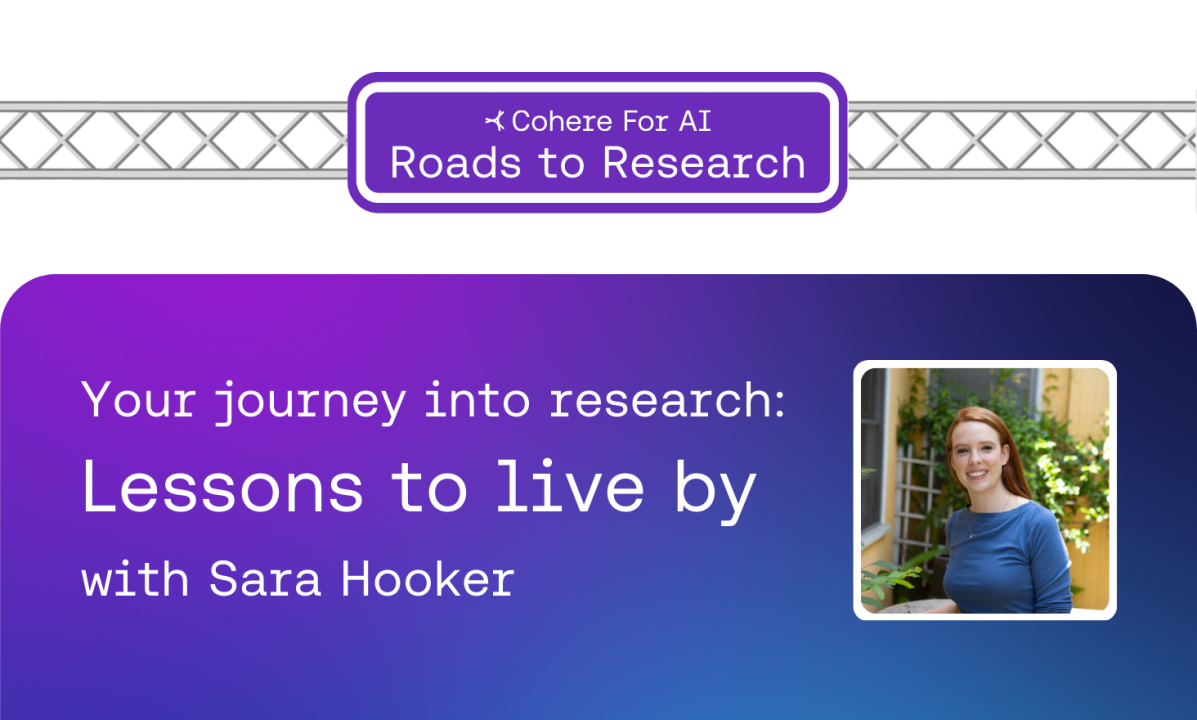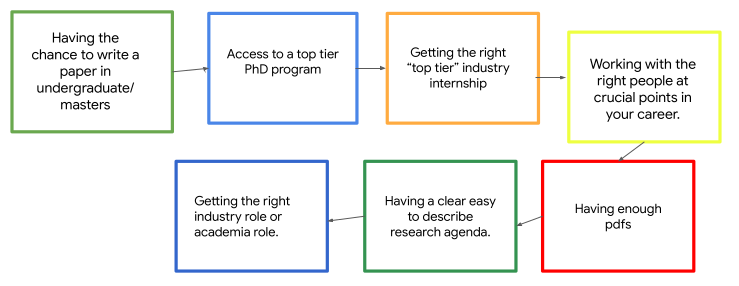your journey into research: lessons to live by - key takeaways
Table of Contents
- Introduction
- How do you decide what to work on?
- What makes a scientific question interesting?
- Best practices for your first research project
- How do you find collaborators or mentors?
- Applying for research internships and PhDs
- Attending conferences
- How do you preserve your sense of self when experiencing failure?
- Notes
Note: This article originally appeared in Cohere for AI’s LinkedIn Pulse blog here.

Introduction
Typically, if you want to get into research full-time, you have to choose between industry and academia. However, to be considered, you have to follow a narrow rubric that requires choices that have to be made very early in your career, and in a very precise and timely manner.

But what happens to most people who are left out because of this rubric? The “Cohere For AI: Roads to Research” series demystifies this rubric and aims to create new spaces where state-of-the-art research happens and empower more entry points into machine learning research.
How do you decide what to work on?
For a beginner in research, it is recommended to decide based on people you would like to work with, or a research question that you find interesting, rather than a specific sub-domain. Working with people who are more advanced in research than you are will help you learn much faster. For your first project, you would also want to get up to speed in one domain, instead of being general in your learning. This will teach you how to iterate end-to-end in any given topic. Also, it is best not to be attached to a particular domain, considering how domain popularity changes very quickly.
Once you decide on a research topic, become an expert in your research scope by spending 2-3 weeks on it. Get your foundations down by focusing on related work, datasets, and baselines.
What makes a scientific question interesting?
This ultimately depends on you and your opinion, but generally, the following points can be used as a guide. A research question should not be about small incremental improvements to, or small pivots of existing research. Instead, it should be something you care about and inform a wider perspective of the field. A research question could also interest you because of intelligent and passionate collaborators working on it who make you feel like you have something to learn from them.
Best practices for your first research project
For your first research project, it is better to narrow it down to one project instead of doing a lot of things. You can reach out with ideas to more experienced researchers, but often collaborating on someone else’s idea is more valuable. Invest in your engineering skills which will speed up your iteration when working on ideas. When presenting your work, be thoroughly prepared and communicate both your successes and failures. Keep your collaborators up to date with a rolling slide deck, and always give recaps of your progress since the previous meetings, while restating the big picture question at the beginning of your meetings. Try to always prepare something to present; it could be questions, or even live sharing code, or just saying that you are still trying to figure out things if nothing worked out.
Most success in life comes not from being consistently great, but rather from being great at being consistent.
How do you find collaborators or mentors?
You could contact authors you admire by email, at least once a month. Presenting your knowledge by writing technical blog posts, teaching, or sharing your work will enable people to find you. Finding peers to start collaborating on a project, and then inviting a mentor after some initial experiments could also work. Remember that it is important to know exactly why you are seeking mentorship since that will affect the timescale and nature of the relationship. Once you have advanced in research, pay it forward if you can by mentoring others.
Applying for research internships and PhDs
You can start by emailing professors or authors you want to work with, to ask if they are supervising incoming students. You should read their papers beforehand, and show that you are familiar with their work. References matter a lot and will be stronger if someone has actively worked with you and knows your work. They will advocate for you, so you need to work with people who care about your future. It is important to learn to speak about the bigger picture regarding your work. Think about how you can communicate your main research questions in an accessible way, instead of narrowly focusing on the specific task you previously looked at. Internships typically run for short periods, like 3 months, so you will normally work on someone else’s idea instead of developing your own. In this case, it is important to figure out if you are excited about the project you will work on. However, for PhD programs which typically have a longer time commitment, it is advisable to speak to students in the program to understand if there’s a fit. The research community is small, so treat each process as a learning curve. A rejection is not the end of the road, since you will likely find another opportunity.
Attending conferences
If you know someone who you would like to catch up with is attending a conference you plan to attend, reach out to them beforehand for a coffee. Ideally, you should be familiar with their research and the papers they’ve written. Poster sessions are the best to meet other researchers. You don’t need to feel pressured to attend everything at a conference, since it is not possible to do so in the first place. Try to connect with others in a way that feels comfortable to you. Also, you don’t always have to talk about research with those you meet.
Research involves many failures before you encounter success.
How do you preserve your sense of self when experiencing failure?
Teach while you learn. This can be through writing technical blog posts, offering mentorship, or giving short talks about technical subjects. You don’t have to know everything to give back the knowledge you have. Try to work on problems you care about. You can also periodically meet someone you are not directly collaborating with casually, or over coffee chats.
Notes
For a recording of the full session, visit here